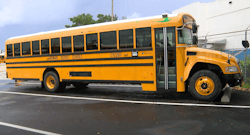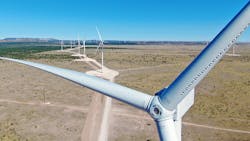Inside: Sustainability
LEED platinum for Georgetown residence hall
Georgetown University says its residential building at 55 H St. NW in downtown Washington, D.C., has received LEED Platinum certification, the first building at Georgetown to do so.
“Achieving LEED Platinum certification is a major accomplishment for Georgetown,” said Meghan Chapple, vice president for sustainability at Georgetown. “55 H is a special building and...the certification is a testament to what a special space it is.”
The facility is an apartment-style residential building for undergraduates in the Capitol Applied Learning Labs program and graduate students across multiple schools. It has modern living spaces, a fitness center, a contemplation space and other common areas.
Among the building’s eco-friendly features is its use of a new concrete technology that leads to a 40% reduction in greenhouse gas emissions compared with traditional concrete.
Solar panels line the building’s green roof and the front-facing side of the building. The building is powered by clean electricity that does not rely on fossil fuels.
The facility has sunshades and high-performance glass windows that change tint depending on the intensity of sunlight, keeping temperatures inside the building down during the warmer months and reducing overall energy consumption.
Electric buses
The Broward County (Fla.)district has acquired 60 zero-emission electric school buses, which will begin transporting students in the coming school year.
The Florida Department of Environmental Protection has awarded the Broward County district a grant of more than $14.8 million to buy the buses. The vehicles will replace older diesel school buses built in or before 2009. Each electric bus is a standard 72-passenger vehicle that produces no emissions at the tailpipe and is quiet on the road.
To complete the needed infrastructure to operate the buses, Florida Power & Light Company has obtained a federal grant and partnered with the district to install charging stations at the district's six transportation terminals.
Broward County officials say that the new vehicles means it will be operating the largest fleet of electric buses in Florida.
The school system, the nation's sixth-largest, transports 54,000 students a day to and from their campuses. Its Student Transportation and Fleet Services Department operates more than 1,200 buses; about 950 are used to transport students during daily routes.
Wind power for University of California system
In a move to accelerate its clean energy goals, the University of California (UC) system has signed its first-ever wind energy contract.
The university says its contract with SunZia Wind, a 3,500-megawatt (MW) wind project in New Mexico, will enable all of the campuses in the UC system to receive electricity via a 550-mile transmission line.
The expected electricity generation from the university system's 85 MW portion of SunZia is equivalent to the total annual electricity consumption of UC Santa Cruz, UC Santa Barbara, UC Riverside and UC Merced combined.
“This wind contract represents another milestone achievement for the University of California," said David Phillips, associate vice president of capital programs, energy and sustainability. "The SunZia project expands the systemwide collaboration needed to support each of our campuses as they complete their plans to transition away from fossil fuels,”
Pattern Energy, the company that is developing SunZia Wind, says that SunZia Wind and Transmission will combine to create the largest clean energy infrastructure project in United States history.
Construction is expected to start this year and commercial operation is anticipated in 2026.



